- Home
- Susan Hill
The Shadows in the Street Page 10
The Shadows in the Street Read online
Page 10
Page 10
‘Abi,’ Leslie Blade shouted across the road. ‘Abi. ’
Abi Righton stopped dead.
‘Abi, over here, please, come over. ’
She walked at an angle across the road, keeping her eye on the police.
‘All right, love, not a problem, you haven’t anything to worry about. Just a word if you don’t mind. ’
Abi shrugged, kept her distance.
‘He wants you to say you know me, and –’
‘Thank you, but if you’d just leave it to me, sir. Can I have your name first please, miss?’
Abi hesitated.
‘Like I said, there’s no problem far as you’re concerned. ’
‘OK. Abi. Abi Righton. ’
‘Address?’
‘Do I have to?’
‘No, but it’d make me happier. ’
‘11c Barter Road. ’
Leslie tried to catch her eye but Abi stared at a spot beyond the car.
‘I’d like you to tell me if you recognise this man, please. ’
‘Yeah. I recognise him. What’s he done?’
‘Can you give me his name?’
‘You arrested him then?’
‘No, he is not under arrest. Do you know his name?’
‘Leslie. Leslie something. We call him – Les. ’
‘Just Les?’
‘Yes. ’
‘Know another name?’
‘No. ’
‘Can you tell me anything more about him, to corroborate what he’s told us?’
‘I don’t know what he’s told you, do I?’
‘Any idea why he’s here? I gather you see him from time to time out this way. ’
‘Oh yeah, he brings us stuff, sandwiches and tea and that. ’
‘When you say “us” …’
‘The girls. ’
‘Any in particular?’
‘No. Anyone. I got no idea why he does it but he does. Kindness of his heart, I suppose. He doesn’t preach or give us leaflets or anything. ’
‘Does he, er, how can I put it, do you pay him for the food and so on?’
‘If you mean, is he a punter, then no, he bloody isn’t. He just likes a chat, hangs around a bit, talks to us about stuff. ’
‘What sort of stuff?’
Abi shrugged. ‘Anything. What people talk about. Weather and how nobody’s got any money and is the royal family a waste of space and what music do you like. Just stuff. ’
‘Right. OK, thanks. I don’t need to keep you. Only I would just say you’d be better off at home, not on the streets, you know. ’
‘Better off? How come?’
‘Safer, warmer, out of harm’s way. ’
‘Safe enough here. We look out for each other. The Reachout van comes. More than you lot do. ’
‘All the same. No life for a young girl, is it, Abi? I’ve a daughter. I wouldn’t want this for her. ’
‘No, right, well, let’s hope you don’t get it. ’ Abi pushed her hands into her pockets and turned away.
‘I can go as well, I imagine,’ Leslie Blade said.
‘Just a word though, same as to the girl. Might be best if you didn’t hang around here, chatting to them, sandwiches or no. ’
‘And why would that be? Am I committing an offence?’
‘No. All the same, better leave it to the authorities – the Reachout van and so on. Better leave it to them. ’
‘If there isn’t anything else, officer?’
The policeman shut his notebook. ‘On your way then, sir. Thanks for your cooperation. Drive carefully. ’
Leslie drove down the main road for a couple of miles, turned onto the bypass, left it at the roundabout, skirted the Hill, and in less than fifteen minutes was back beside the empty shops. The patrol car had gone and neither Abi nor any of the other girls was on the street. He pulled in and waited a while, then went round the block and down towards the canal. Still no one.
He could hear the cathedral chimes for midnight ringing round the cold and empty streets as he drove away. From the shadows near the towpath the one they called Beanie Man saw him. Watched. Waited.
‘The leccy’s nearly gone,’ Hayley said the second Abi opened the door. ‘You got any change?’
Abi pulled thirty pounds in notes from her miniskirt pocket and went to the cupboard over the sink. The cornflakes packet where she kept pound coins for the meter was empty. The room was cold, all three children asleep together under one duvet on the bed, Hayley with her parka pulled up round her neck huddled into the chair.
‘There was ten quid in here,’ Abi said. ‘Where’s that gone?’
Hayley’s face was pinched, her eyes red.
‘You must have used it. ’
Hayley had been biting her nails.
‘I didn’t use it, and nobody else has been in here. Except you. ’
Hayley shrugged.
‘OK, I’ll go downstairs, see if they’ve got any change. Only I know you had it and I want it back, right?’
When Abi returned and fed the meter, Hayley was making tea.
‘I had a good idea,’ she said.
‘What, like nicking my leccy money? I’m telling you, I want it back. You work tomorrow and you give it me, right?’
‘No, listen, where I live, the flat below’s gone empty. ’
‘So? God, I’m bloody frozen. I’m having a Cuppa Soup. You want one?’
‘We could have it. It’s got two bedrooms, it’s got a separate kitchen. We could have that. ’
‘What do you mean, we could have it?’
‘Rent it. You, me, our kids. It’s a whole lot better than here and mine, and we could do it up. ’
‘You’re joking, right?’
‘No, I’m not, what would I be joking for? It’s a good idea. ’
‘Not in my book. ’
‘Save me traipsing here with Liam all the time. Save a load of money as well. ’
‘How do you make that out?’
‘Oh, work it out. Anyway, it’s a flat that’s going and I think we should have it. ’
‘Looks funny. Two girls living together. People’d think. ’
‘Let ’em bloody think then. ’
Abi poured water into two mugs.
‘It was dead tonight,’ she said, turning the television on low, ‘one punter, nobody else out there. Bloody freezing. ’
‘… her mother, Mrs Audrey Buckley, reported Chantelle missing. She was last seen five days ago walking towards the bus station. Chantelle, who is seventeen, was wearing a distinctive bright green nylon jacket and short skirt. Mrs Buckley, of Aberdeen Way, Bevham, said that Chantelle sometimes stayed overnight with friends but none of them had seen her this week and …’
‘I saw her,’ Abi said.
The CCTV picture of the girl walking down a street was replaced by a snapshot of her with a dog, younger, darker hair.
‘That’s her, deffo. She was on my patch. Naff jacket. Didn’t think she’d stay around. ’
They watched the rest of the news, eating a packet of Jaffa Cakes.
‘See, that’s why there’s no punters out there,’ Hayley said, ‘it’s this credit crunch. ’
‘I flippin’ hope not. Anyway, you’d think there’d be more of them, not less, cheer themselves up. ’
It was as the weather chart came on the screen that it occurred to Abi. ‘That girl,’ she said, ‘that Chantelle with the green jacket. ’
‘What about her?’
‘Only I haven’t seen Marie for over a week. ’
‘Be her mother playing up again then. Or that dosser Jonty. ’
‘Maybe. ’
‘You know she goes off, Abs, she went off before, you remember. Last summer. ’
‘OK. ’ Abi reached for another Jaffa Cake. ‘You’re probably right. ’
‘I’m always right. I’m right about tha
t flat as well. ’
Abi chucked the empty biscuit packet at her.
Hayley and Liam left just before nine the next morning.
‘Just come and have a look at it, you don’t have to make up your mind, only it’d be great, Abs, think how much more room the kids’d have, think of a proper kitchen. Just come and have a look. ’
But Abi wouldn’t promise anything. She needed to think a lot of things out before she got tempted by looking at any flat and committing herself when she wasn’t ready. Hayley wasn’t dependable. She was still liable to dope herself up and then wouldn’t be fit to work or look after the kids, she was still liable to hitch up with some no-hoper and bring him home. The room Abi lived in was a dump, small, cold, shared toilet and bath and only a corner to cook in, but it was hers, she felt safe in it, and it was cheap. She’d been able to save. She had the kids where she could see them and they were safe as well. Chuck this away to share with Hayley and there’d be a load of what-ifs.
It was playgroup morning for Frankie. After she’d left him, Abi stood on the corner waiting for the bus to the supermarket. She always went when it was just her and Mia, did her shop and then had breakfast, one good cooked plateful. Mia had bits off hers and an egg of her own. She bought a magazine, Mia went to sleep, she had a second coffee. Happy. Sometimes, sitting in the supermarket café, in the warmth and brightness, people all around her, she felt OK, and when she thought about it, she knew it was because she felt normal. She could be anybody, a mum with a toddler, house to go back to. Not doing what she did. Normal. Only this morning, she suddenly knew she had to do something else. She’d woken half a dozen times in the night and each time it was there, churning round her mind, and when she had slept again it had flitted in and out of her dreams.
She crossed the road and caught a bus in the opposite direction, then walked. Mia slept. A raw wind snaked towards her bare legs.
She’d thought it was a short walk but it took twenty-five minutes before she was at the broken gate leading through rough grass into the field. The caravan was on the far side, standing in a patch of mud and nettles. Abi could see the door swinging open. She couldn’t push the buggy over the thick grass and ruts, so she lifted Mia out and carried her.
There was no sound. She hesitated, then knocked on the open door. But she knew she wouldn’t get any reply, and in the end she just went in, and found the place wrecked, as if someone had taken a sledgehammer to it, table, cupboards, benches, sink, windows, the lot, everything was smashed and splintered and the floor was covered in broken bits of wood and cushions from the bench. The television was upside down, smashed, and plates and cups had been smashed too, there was crockery and glass all over. But nothing else. Nobody. No sign that anyone had even been living here except for a few clothes, pulled out of a cardboard box and piled onto the mess. She recognised a sweatshirt, and one shoe from a black patent pair Marie wore.
Mia had woken and was looking round, her face bewildered, and the wind blew at them across the field and cut round their heads.
‘OK,’ Abi said, ‘OK …’
She ploughed her way back across the field, collected the buggy and went through the broken gate into the lane. Mia had started to cry.
Abi walked fast, to get warm, to get away, and to help herself think about what she ought to do.
Sixteen
Marley had his head out of the stable and began to toss it about and whinny with anticipation when Stacey drew up. She thought he knew Saturday and Sunday the minute dawn broke, though it was light later in the mornings now, the long days when they had started their ride at five and six o’clock were over. Still, she liked to be at the stables as early as she could, stretching the weekend out.
Marley was a sure-footed, Coloured horse, the easiest Stacey had ever owned. The livery stables were three miles outside Lafferton on the Starly side so she could ride for a couple of hours without hitting much traffic, across the hill track and out onto the moor. But the weekends were sometimes a problem up there because of the mountain bikers and scramblers, and today she had heard on the early local news about a rally, so she took Marley along the road and through the gate that led towards the canal towpath. They might meet dog walkers and runners, sometimes other riders, but never noisy bikes. Not that Marley was bothered – he was that rare thing, the genuinely bomb-proof horse.
There was no one on the path. Here the canal broadened out and flowed through the fields between pollarded willows. There was a thin mist floating over the water. With luck, Stacey thought, the sun would break through and it would be a fantastic day. She leaned forward to pat Marley’s neck.
Marley was always keen to get going, but once out he was never wound up, never over-energetic, happy to canter if she pushed him but otherwise just to amble. He was ambling when she saw it. At first, she couldn’t tell what it was – a bundle of clothes or rubbish caught up in the roots of a tree maybe – but she kicked the horse on to go nearer. It looked odd.
He wouldn’t go nearer. He stopped dead and tossed his head slightly. Stacey kicked. He wasn’t a horse that just stopped. He never did that.
‘Come on, come on, boy, what are you playing at? Walk on. ’
It took a lot to get him to move. She could feel him, torn between reluctance, the desire to stand his ground, and his usual willingness to do as he was asked.
‘Walk on, Marley. ’
After a moment or two, he walked.
From where she was, sixteen hands above the dark water, Stacey had a view but not a full view. She waited, looked around, saw no one, no walker, no runner, not even a random dog.
She didn’t want to go closer, didn’t want to find out, didn’t want to get off the safety of the horse’s back. But she knew she had to. She couldn’t just go. She knew she couldn’t.
She slid to the ground and went slowly closer, hanging onto Marley’s reins, not because Marley would ever bolt away, but for her own reassurance. Because she knew, she said afterwards, she knew all along really, she didn’t think it was a bundle of old clothes from the first second.
She knew.
Thank God for mobile phones, though her hands were shaking so much she could hardly dial. The police were there in ten, maybe less, she heard the screaming tyres, saw them jump the stile and come running, and by then she was sitting on the ground, her head between her knees and the reins hooked over her arm, Marley’s reins, her lifeline to the great, steady, warm, breathing safety of her horse, who was cropping the grass beside her.
The body of Chantelle Buckley had caught in the tree roots and the water flowed on round it and away, as if it was somehow abandoning her. She had been strangled and there were cuts about her face, though at first the cuts mingled with the bruising and bloating and discoloration and were not clear. The pathologist would find them later, when she was stripped and labelled and under the cold white lights on the slab. Surprisingly, she was fully clothed, in short skirt, T-shirt, torn green jacket, though inevitably the shoes had gone, pulled off by the movement through the water.

 Mrs De Winter
Mrs De Winter A Question of Identity
A Question of Identity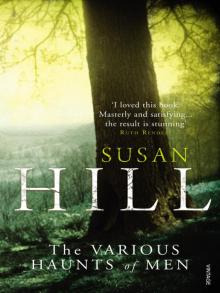 The Various Haunts of Men
The Various Haunts of Men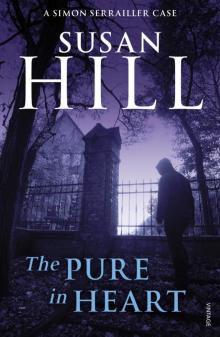 The Pure in Heart
The Pure in Heart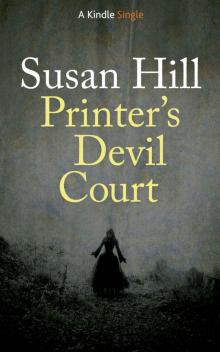 Printer's Devil Court
Printer's Devil Court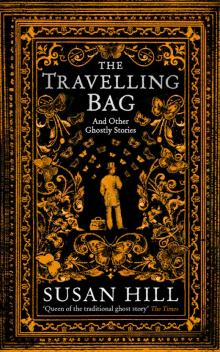 The Travelling Bag
The Travelling Bag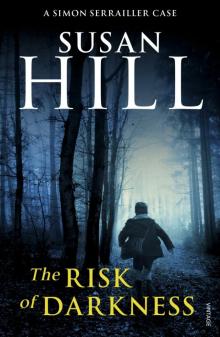 The Risk of Darkness
The Risk of Darkness A Kind Man
A Kind Man Black Sheep
Black Sheep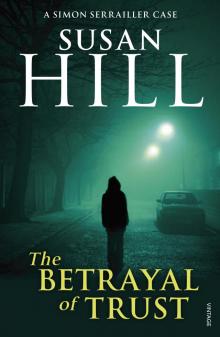 The Betrayal of Trust
The Betrayal of Trust The Service of Clouds
The Service of Clouds Betrayal of Trust
Betrayal of Trust The Small Hand
The Small Hand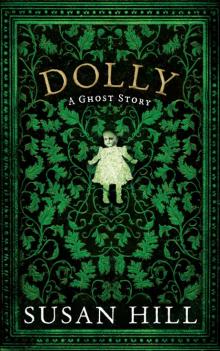 Dolly
Dolly Jacob's Room Is Full of Books: A Year of Reading
Jacob's Room Is Full of Books: A Year of Reading The Vows of Silence
The Vows of Silence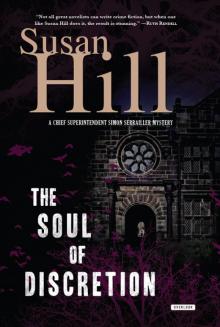 The Soul of Discretion
The Soul of Discretion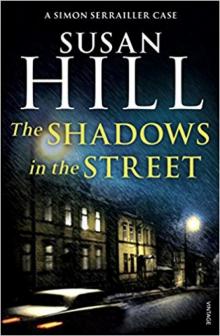 The Shadows in the Street
The Shadows in the Street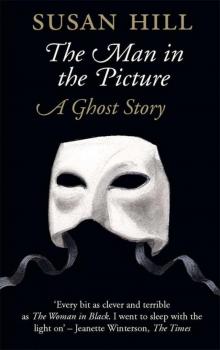 The Man in the Picture
The Man in the Picture Air and Angels
Air and Angels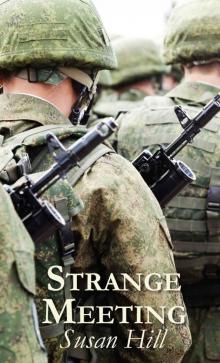 Strange Meeting
Strange Meeting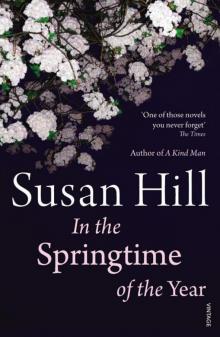 In the Springtime of the Year
In the Springtime of the Year Howards End Is on the Landing: A Year of Reading From Home
Howards End Is on the Landing: A Year of Reading From Home From the Heart
From the Heart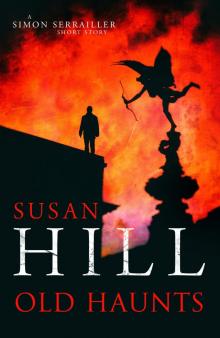 Old Haunts
Old Haunts The Mist in the Mirror
The Mist in the Mirror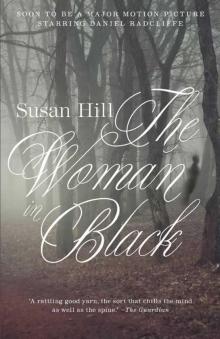 The Woman in Black: A Ghost Story
The Woman in Black: A Ghost Story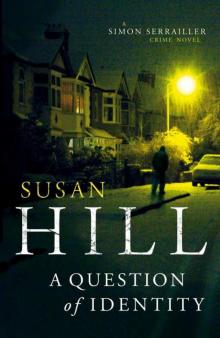 A Question of Identity (Simon Serrailler 7)
A Question of Identity (Simon Serrailler 7)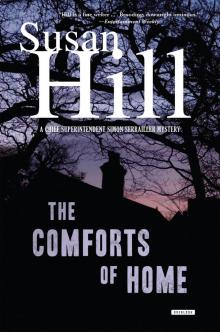 The Comforts of Home
The Comforts of Home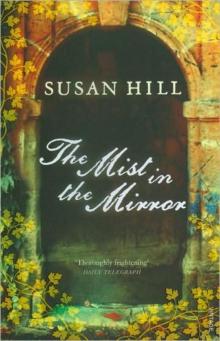 Mist in the Mirror
Mist in the Mirror Jacob's Room is Full of Books
Jacob's Room is Full of Books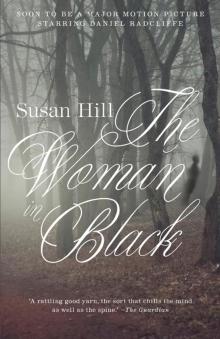 The Woman in Black
The Woman in Black Howards End is on the Landing
Howards End is on the Landing